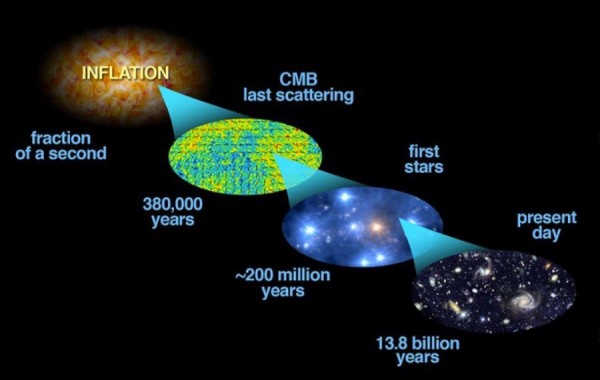“You can try to lie to yourself. You can try to tell yourself that you put in the time. But you know — and so do I.” -J.J. Watt
Before there was the Universe we know and love today, there were many epochs and eras that came before, including one before there were galaxies and stars, one before there were atoms, one before there were nuclei, and even one where matter and antimatter were spontaneously created at ultra-high energies.
But throughout all those eras, spacetime has been a constant companion. Given that we had an epoch of inflation before the Big Bang description explained our Universe, what can we say about the birth of space and time in our Universe, or at all?
We probe the limits of everything, including what we know, on this week's Ask Ethan!



@Ethan: In the text of your posting, you've swapped "Option 1" and "Option 2" relative to the figure. In the figure, the first option is the infinite past, while the second is an initial singularity.
Thank you for that catch; I fixed it in the first appearance of the image.
The wikipedia page for inflation says: "The inflationary epoch lasted from 10−36 seconds after the Big Bang to sometime between 10−33 and 10−32 seconds."
[http://en.wikipedia.org/wiki/Inflation_%28cosmology%29]
What theory is wikipedia referring to? Can you please write an article comparing that theory with the one you cite that says inflation came before the Big Bang?
You noticed that the question borders on the philosophical issues and "nudged" it over to Physics alone with "...But that may not be fair, in the sense that the theorem is based on the known laws of physics, and applying them to a time when the known laws of physics break down..." - Physics is by definition experimental/observational science. "Laws of Physics" as we know them are solid until you have both theory about their change and experimental proof of that theory. By adding that bit to discussion we arrive at the inevitable: question you pose is, to the best we know of Science and Physics at the moment, transcendental. Purely philosophical or religious. Because as of the best that we know and can(!) know - there is no measuring what was if any before BigBang and to the best that we know, inflation was finite, if not painfully short.
IMHO some of the things in the essay were portrayed as "what we know" when they remain hypothetical. I don't have any problem with the expanding universe, and when you wind it back IMHO you've got a big bang of sorts. But there's no actual evidence for inflation per se, and the original frozen star black hole interpretation might suggest that the early universe wasn't a singularity thence hot, but instead was motionless and cold.
John, in science, ALL knowledge is contingent on current understanding, open to changes. It's a major reason why anything with god/religion/faith in it IS NOT SCIENCE.
Rather than explain the minutae every time, lets just accept that we know what we *currently* know and call it knowledge.